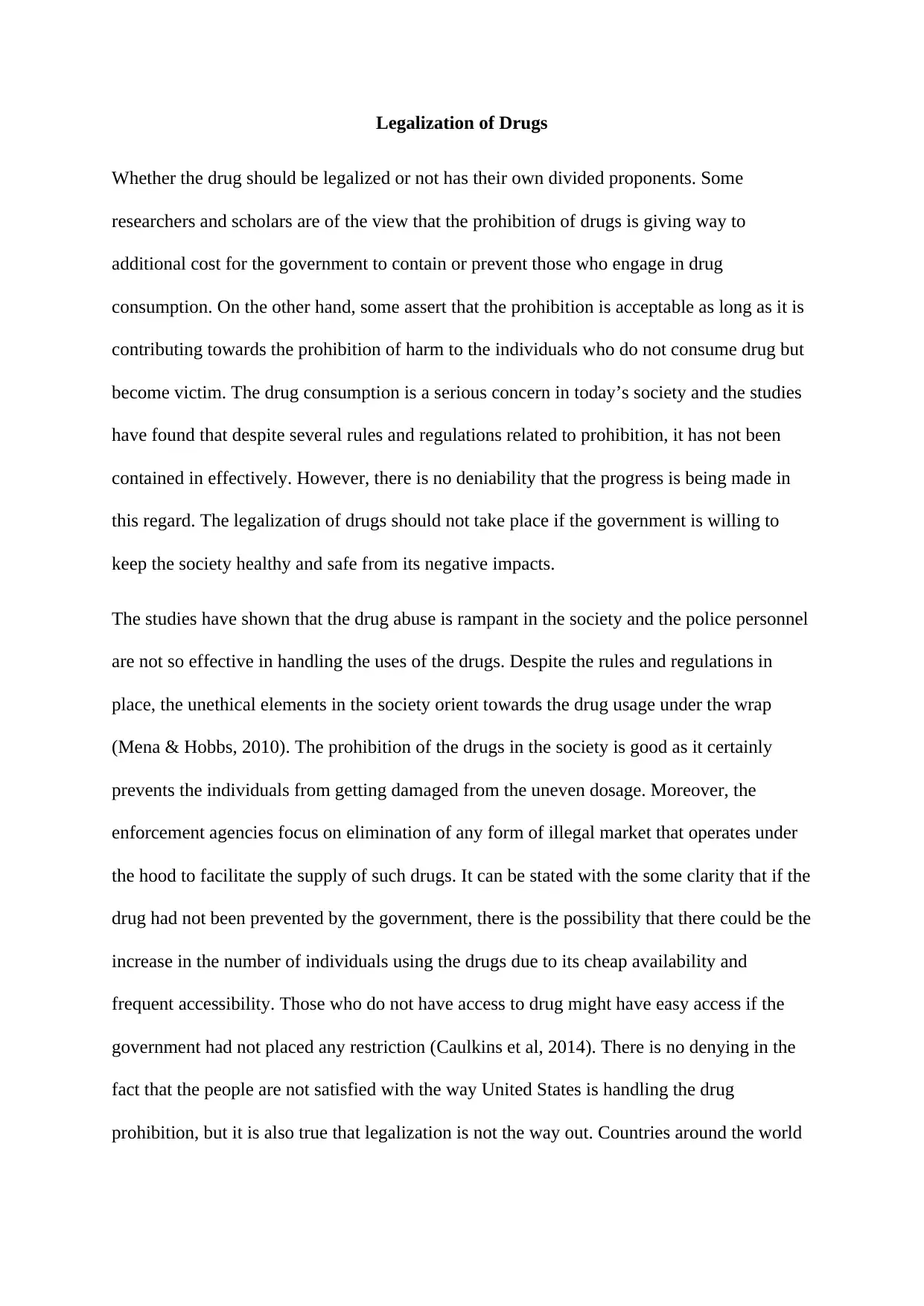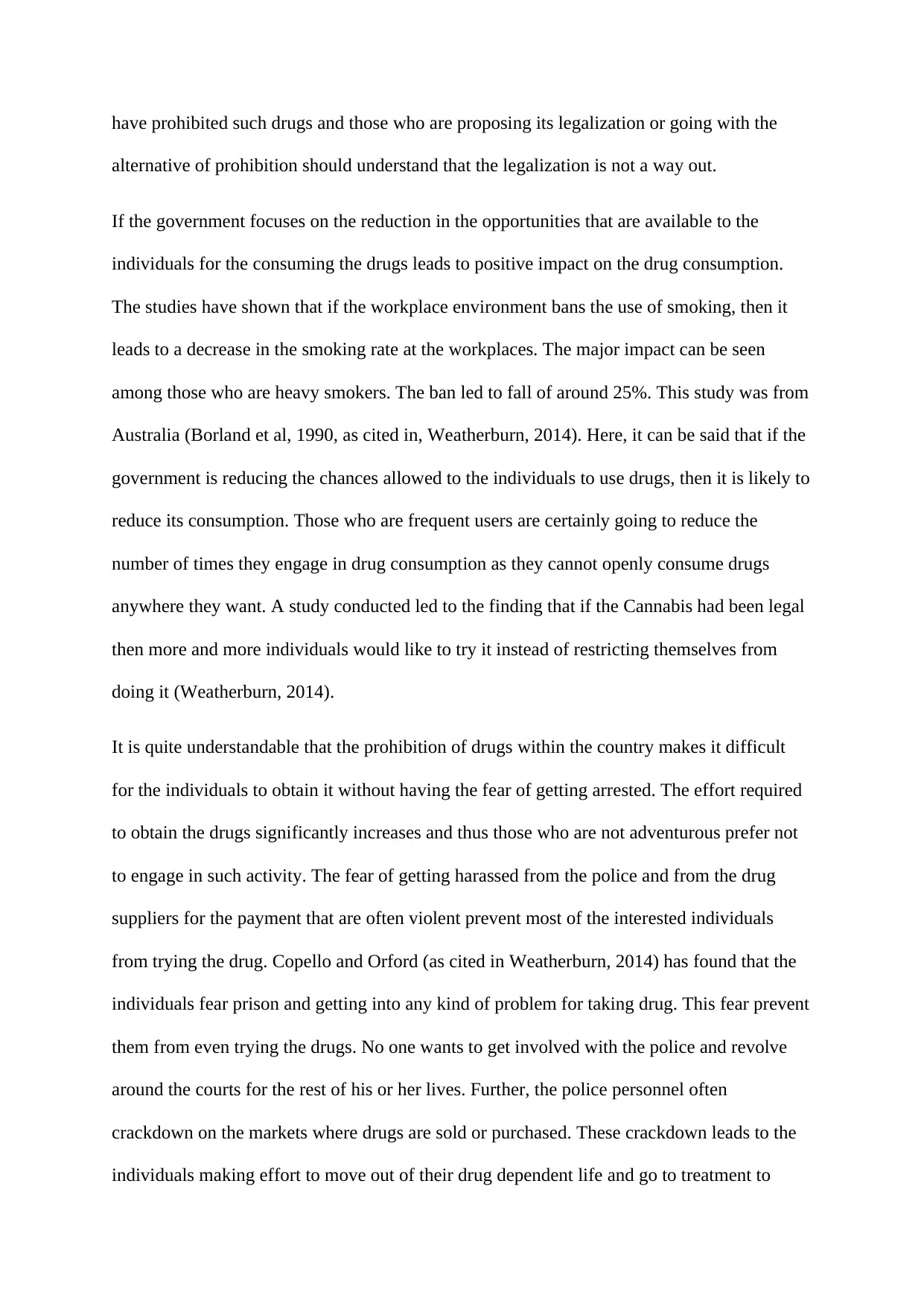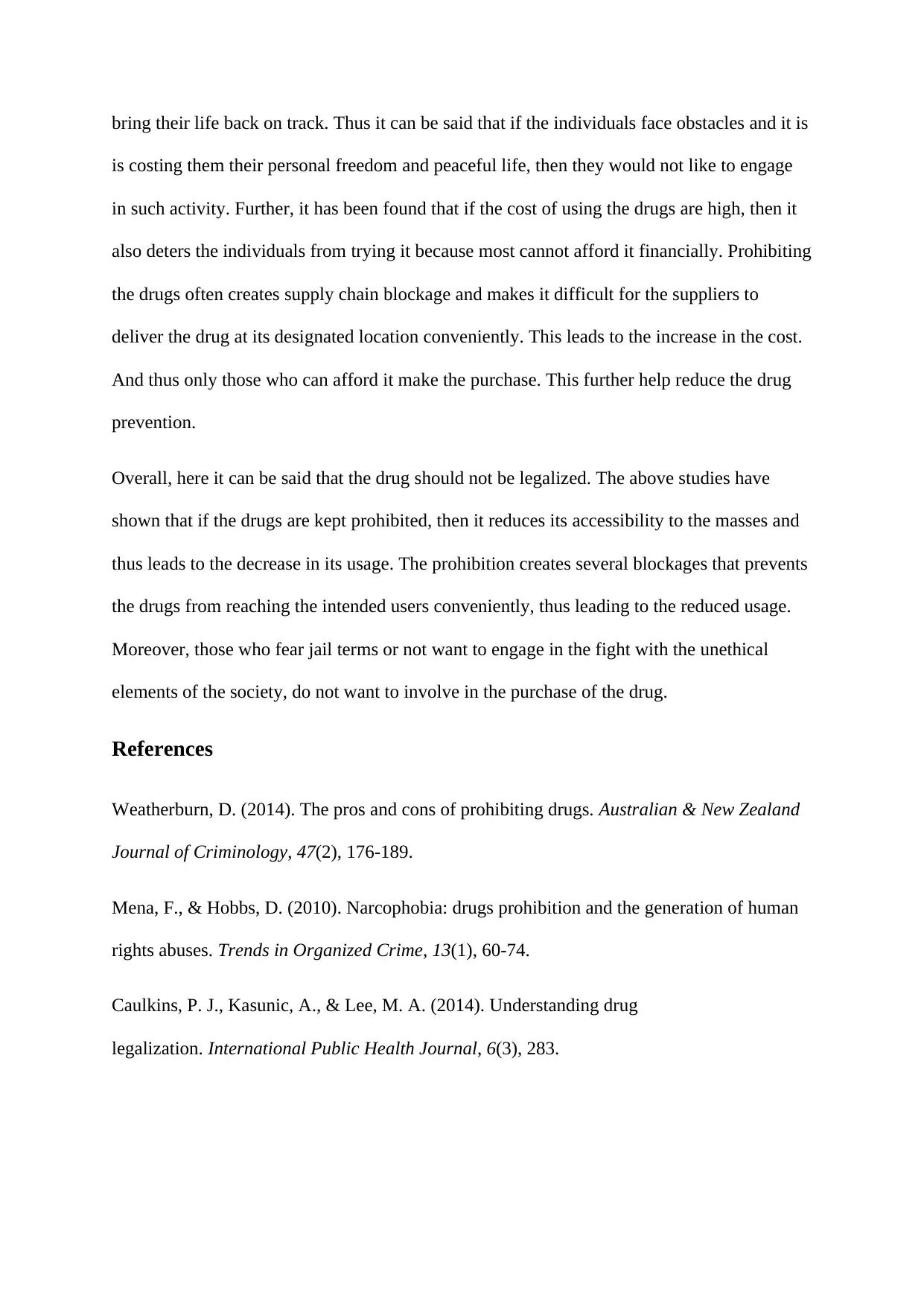The Complex Debate: Legalization of Drugs and Its Implications
VerifiedAdded on 2019/09/22
|3
|1137
|269
Essay
AI Summary
This essay delves into the complex debate surrounding the legalization of drugs, presenting arguments from various perspectives. It examines the viewpoints of researchers and scholars, highlighting the costs associated with drug prohibition and the potential harms of drug consumption. The essay argues against legalization, citing studies that demonstrate the effectiveness of prohibition in reducing drug accessibility and usage. It explores how workplace bans, increased costs, and the fear of legal consequences deter drug consumption. The essay references several studies to support its claims, including the impact of workplace smoking bans in Australia, the potential increase in drug use if cannabis were legal, and the deterrent effect of police crackdowns on drug markets. The author concludes that the prohibition of drugs is a more effective approach to maintaining a healthy and safe society, emphasizing the importance of reducing opportunities for drug consumption.

Legalization of Drugs
Whether the drug should be legalized or not has their own divided proponents. Some
researchers and scholars are of the view that the prohibition of drugs is giving way to
additional cost for the government to contain or prevent those who engage in drug
consumption. On the other hand, some assert that the prohibition is acceptable as long as it is
contributing towards the prohibition of harm to the individuals who do not consume drug but
become victim. The drug consumption is a serious concern in today’s society and the studies
have found that despite several rules and regulations related to prohibition, it has not been
contained in effectively. However, there is no deniability that the progress is being made in
this regard. The legalization of drugs should not take place if the government is willing to
keep the society healthy and safe from its negative impacts.
The studies have shown that the drug abuse is rampant in the society and the police personnel
are not so effective in handling the uses of the drugs. Despite the rules and regulations in
place, the unethical elements in the society orient towards the drug usage under the wrap
(Mena & Hobbs, 2010). The prohibition of the drugs in the society is good as it certainly
prevents the individuals from getting damaged from the uneven dosage. Moreover, the
enforcement agencies focus on elimination of any form of illegal market that operates under
the hood to facilitate the supply of such drugs. It can be stated with the some clarity that if the
drug had not been prevented by the government, there is the possibility that there could be the
increase in the number of individuals using the drugs due to its cheap availability and
frequent accessibility. Those who do not have access to drug might have easy access if the
government had not placed any restriction (Caulkins et al, 2014). There is no denying in the
fact that the people are not satisfied with the way United States is handling the drug
prohibition, but it is also true that legalization is not the way out. Countries around the world
Whether the drug should be legalized or not has their own divided proponents. Some
researchers and scholars are of the view that the prohibition of drugs is giving way to
additional cost for the government to contain or prevent those who engage in drug
consumption. On the other hand, some assert that the prohibition is acceptable as long as it is
contributing towards the prohibition of harm to the individuals who do not consume drug but
become victim. The drug consumption is a serious concern in today’s society and the studies
have found that despite several rules and regulations related to prohibition, it has not been
contained in effectively. However, there is no deniability that the progress is being made in
this regard. The legalization of drugs should not take place if the government is willing to
keep the society healthy and safe from its negative impacts.
The studies have shown that the drug abuse is rampant in the society and the police personnel
are not so effective in handling the uses of the drugs. Despite the rules and regulations in
place, the unethical elements in the society orient towards the drug usage under the wrap
(Mena & Hobbs, 2010). The prohibition of the drugs in the society is good as it certainly
prevents the individuals from getting damaged from the uneven dosage. Moreover, the
enforcement agencies focus on elimination of any form of illegal market that operates under
the hood to facilitate the supply of such drugs. It can be stated with the some clarity that if the
drug had not been prevented by the government, there is the possibility that there could be the
increase in the number of individuals using the drugs due to its cheap availability and
frequent accessibility. Those who do not have access to drug might have easy access if the
government had not placed any restriction (Caulkins et al, 2014). There is no denying in the
fact that the people are not satisfied with the way United States is handling the drug
prohibition, but it is also true that legalization is not the way out. Countries around the world
Paraphrase This Document
Need a fresh take? Get an instant paraphrase of this document with our AI Paraphraser

have prohibited such drugs and those who are proposing its legalization or going with the
alternative of prohibition should understand that the legalization is not a way out.
If the government focuses on the reduction in the opportunities that are available to the
individuals for the consuming the drugs leads to positive impact on the drug consumption.
The studies have shown that if the workplace environment bans the use of smoking, then it
leads to a decrease in the smoking rate at the workplaces. The major impact can be seen
among those who are heavy smokers. The ban led to fall of around 25%. This study was from
Australia (Borland et al, 1990, as cited in, Weatherburn, 2014). Here, it can be said that if the
government is reducing the chances allowed to the individuals to use drugs, then it is likely to
reduce its consumption. Those who are frequent users are certainly going to reduce the
number of times they engage in drug consumption as they cannot openly consume drugs
anywhere they want. A study conducted led to the finding that if the Cannabis had been legal
then more and more individuals would like to try it instead of restricting themselves from
doing it (Weatherburn, 2014).
It is quite understandable that the prohibition of drugs within the country makes it difficult
for the individuals to obtain it without having the fear of getting arrested. The effort required
to obtain the drugs significantly increases and thus those who are not adventurous prefer not
to engage in such activity. The fear of getting harassed from the police and from the drug
suppliers for the payment that are often violent prevent most of the interested individuals
from trying the drug. Copello and Orford (as cited in Weatherburn, 2014) has found that the
individuals fear prison and getting into any kind of problem for taking drug. This fear prevent
them from even trying the drugs. No one wants to get involved with the police and revolve
around the courts for the rest of his or her lives. Further, the police personnel often
crackdown on the markets where drugs are sold or purchased. These crackdown leads to the
individuals making effort to move out of their drug dependent life and go to treatment to
alternative of prohibition should understand that the legalization is not a way out.
If the government focuses on the reduction in the opportunities that are available to the
individuals for the consuming the drugs leads to positive impact on the drug consumption.
The studies have shown that if the workplace environment bans the use of smoking, then it
leads to a decrease in the smoking rate at the workplaces. The major impact can be seen
among those who are heavy smokers. The ban led to fall of around 25%. This study was from
Australia (Borland et al, 1990, as cited in, Weatherburn, 2014). Here, it can be said that if the
government is reducing the chances allowed to the individuals to use drugs, then it is likely to
reduce its consumption. Those who are frequent users are certainly going to reduce the
number of times they engage in drug consumption as they cannot openly consume drugs
anywhere they want. A study conducted led to the finding that if the Cannabis had been legal
then more and more individuals would like to try it instead of restricting themselves from
doing it (Weatherburn, 2014).
It is quite understandable that the prohibition of drugs within the country makes it difficult
for the individuals to obtain it without having the fear of getting arrested. The effort required
to obtain the drugs significantly increases and thus those who are not adventurous prefer not
to engage in such activity. The fear of getting harassed from the police and from the drug
suppliers for the payment that are often violent prevent most of the interested individuals
from trying the drug. Copello and Orford (as cited in Weatherburn, 2014) has found that the
individuals fear prison and getting into any kind of problem for taking drug. This fear prevent
them from even trying the drugs. No one wants to get involved with the police and revolve
around the courts for the rest of his or her lives. Further, the police personnel often
crackdown on the markets where drugs are sold or purchased. These crackdown leads to the
individuals making effort to move out of their drug dependent life and go to treatment to

bring their life back on track. Thus it can be said that if the individuals face obstacles and it is
is costing them their personal freedom and peaceful life, then they would not like to engage
in such activity. Further, it has been found that if the cost of using the drugs are high, then it
also deters the individuals from trying it because most cannot afford it financially. Prohibiting
the drugs often creates supply chain blockage and makes it difficult for the suppliers to
deliver the drug at its designated location conveniently. This leads to the increase in the cost.
And thus only those who can afford it make the purchase. This further help reduce the drug
prevention.
Overall, here it can be said that the drug should not be legalized. The above studies have
shown that if the drugs are kept prohibited, then it reduces its accessibility to the masses and
thus leads to the decrease in its usage. The prohibition creates several blockages that prevents
the drugs from reaching the intended users conveniently, thus leading to the reduced usage.
Moreover, those who fear jail terms or not want to engage in the fight with the unethical
elements of the society, do not want to involve in the purchase of the drug.
References
Weatherburn, D. (2014). The pros and cons of prohibiting drugs. Australian & New Zealand
Journal of Criminology, 47(2), 176-189.
Mena, F., & Hobbs, D. (2010). Narcophobia: drugs prohibition and the generation of human
rights abuses. Trends in Organized Crime, 13(1), 60-74.
Caulkins, P. J., Kasunic, A., & Lee, M. A. (2014). Understanding drug
legalization. International Public Health Journal, 6(3), 283.
is costing them their personal freedom and peaceful life, then they would not like to engage
in such activity. Further, it has been found that if the cost of using the drugs are high, then it
also deters the individuals from trying it because most cannot afford it financially. Prohibiting
the drugs often creates supply chain blockage and makes it difficult for the suppliers to
deliver the drug at its designated location conveniently. This leads to the increase in the cost.
And thus only those who can afford it make the purchase. This further help reduce the drug
prevention.
Overall, here it can be said that the drug should not be legalized. The above studies have
shown that if the drugs are kept prohibited, then it reduces its accessibility to the masses and
thus leads to the decrease in its usage. The prohibition creates several blockages that prevents
the drugs from reaching the intended users conveniently, thus leading to the reduced usage.
Moreover, those who fear jail terms or not want to engage in the fight with the unethical
elements of the society, do not want to involve in the purchase of the drug.
References
Weatherburn, D. (2014). The pros and cons of prohibiting drugs. Australian & New Zealand
Journal of Criminology, 47(2), 176-189.
Mena, F., & Hobbs, D. (2010). Narcophobia: drugs prohibition and the generation of human
rights abuses. Trends in Organized Crime, 13(1), 60-74.
Caulkins, P. J., Kasunic, A., & Lee, M. A. (2014). Understanding drug
legalization. International Public Health Journal, 6(3), 283.
⊘ This is a preview!⊘
Do you want full access?
Subscribe today to unlock all pages.

Trusted by 1+ million students worldwide
1 out of 3
Related Documents
Your All-in-One AI-Powered Toolkit for Academic Success.
+13062052269
info@desklib.com
Available 24*7 on WhatsApp / Email
![[object Object]](/_next/static/media/star-bottom.7253800d.svg)
Unlock your academic potential
Copyright © 2020–2026 A2Z Services. All Rights Reserved. Developed and managed by ZUCOL.





